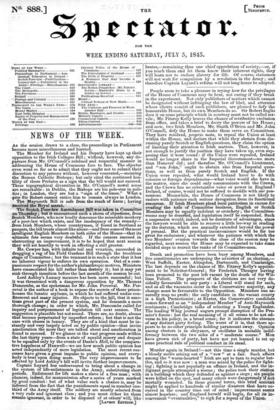People seem to take a pleasure in trying how far
the privileges of the House of Commons may be bent, not caring if they break in the experiment. Not only .publishers of matters which cannot be designated without infriniging the law of libel, and attornies whose clients consist of such publishers, are pleased to defy the honourable House, but its own Members do so. Sir Robert Inglis does it on some principle which in courtesy must not be called ser- vile; Mr. Fitzroy Kelly braves the chance of retributive exclusion from office, and takes a brief to decry the powers of his House; and now, two Irish Members, Mr. Smith O'Brien and Mr. John O'Connell, defy the House to make them serve on Committees. They have resolved, proprio motu, to repeal the Union at least within the House, and declare that while they abstain from dis- cussing purely Scotch or English questions, they claim the option of limiting their attention to Irish matters. 'That, however, is not enough to justify the position they have taken upp, even sup- posing that it were sound : if the Union were repealed,. Ireland would no longer share in the Imperial Government—no more than Hanover did ; and therefore Mr. O'Connell's Lieutenant, and "son John," ought to abstain also from Imperial ques- tions, as well as from purely Scotch and English. If the Union were repealed, what would, Ireland have to do with colonies or foreign dependencies—what voice would she have in the matter, since she could only communicate with the Crown, and the Crown has no substantive voice or power in England T Ireland, of course, would not be suffered to meddle with our pos- sessions. Meanwhile, the House of Commons is not likely to endure with patience such serious derogation from its functional resources. If Irish Members plead local patriotism in excuse for evading the toils of Committee business, English or Scotch Members may be equally indolent or crotchety; the Committee- rooms may be deserted, and legislation itself be suspended. Such a suspension would, indeed, not be destitute of advantages, since the lawyers would be able to recover a little lee-way in reading up the statutes, which are annually extended beyond the power of perusal. But the practical inconvenience would be far too great for endurance ; and whatever the patience with which the two Members' evasion towards the close of the session may be regarded, next session the House may be expected to take some decided steps to recruit the ranks of its Committee-men.


























